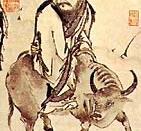PASSAGES FROM THE LAOZI
Written by Lao Dan in the third century, it was originally written in Chinese but later translated into English. The importance of this is that we may be missing some nuance that has been lost in the translation. The Laozi tells us that "humans have separated themselves from the Way by planning and organizing..." "The Laozi can be read in many different ways. It reveals the intellectual ferment of the late Zhou and was one of the favorite books of Chinese people throughout history."
The Laozi can be viewed as a work of mysticism which contains a deeper meaning that cannot be described in language. The passage seems to say that once you go around naming things, the things them become objects. By leaving it alone, you subject it to the ethereal quality it possessed once it was created or came into being.
The fact that Laozi disapproves of desires is apparent in the lines: "Ever without desires, once can observe its secrets, Ever possessed of desires, one can observe its manifestations."
Although these two lines can be read in a variety of way, the way I interpreted it was that without desires, it is possible for a person to see the nameless or the named. It is just up to fact that if the person has an open mind, if they are receptive, they will indeed be able to see these qualities. The second line seems to say, that once a person allows themselves to have desires, the manifestations of these desires will lead to evil and unnatural behavior. Therefore, the main idea that can be derived is that people should stay away from unnecessary desires, because that will make them calculating and distant from dao or the way.
The second stanza is filled with...


